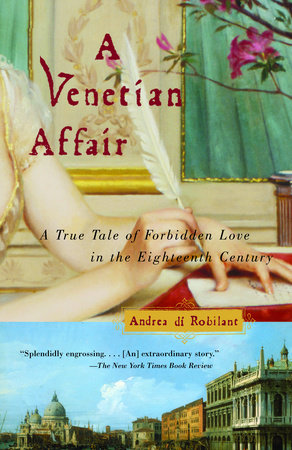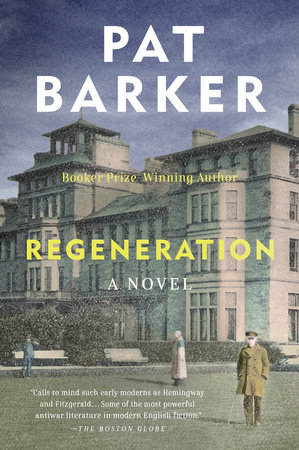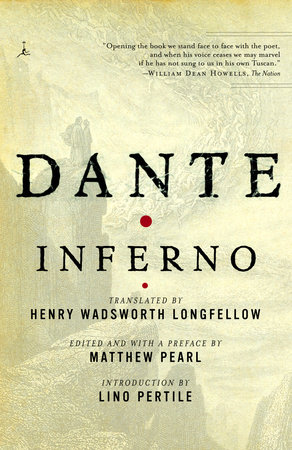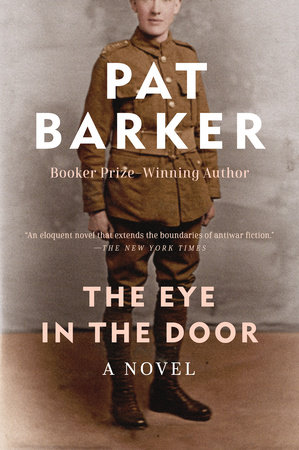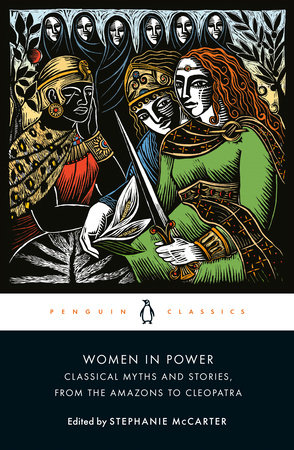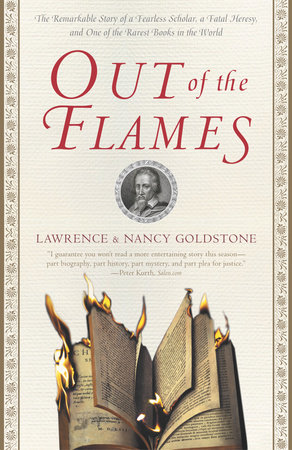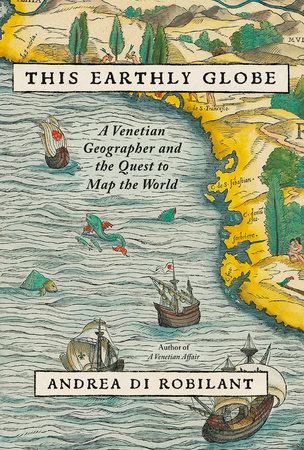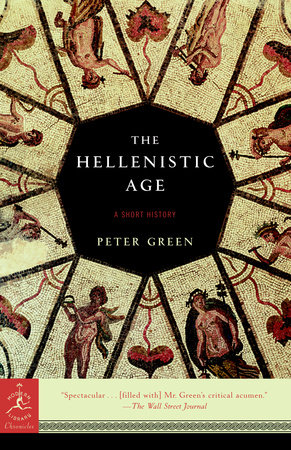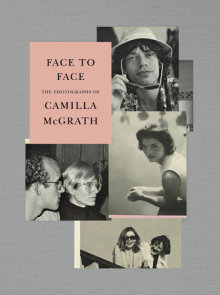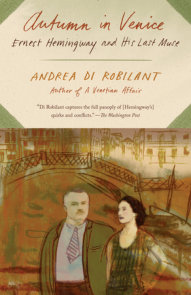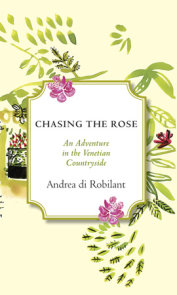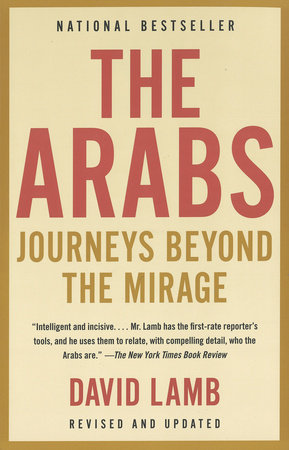Author Q&A
A Conversation with Andrea di Robilant
Q: When you and your father discovered the letters of Giustiniana and Andrea, you could not read them immediately. Some of the letters were written in cipher. How did you crack the code?
A: Trial and error and a lot of patient guess work. We concentrated our effort on figuring out one or two key letters. It was fairly easy after that. My father did most of the work. He was very good at that sort of thing—the cloak and dagger stuff.
Q: Since their romance was forbidden, how and where did the lovers manage to meet? Do you think they found extra pleasure in the furtiveness of their affair?
A: They met in borrowed rooms at the house of conniving friends, in private theater boxes, at the gambling house (Ridotto). As far as I know they never met at each other’s houses. Giustiniana’s family was very protective.
The lovers did seem to enjoy overcoming the obstacles posed by their relatives. "How could they be so stupid,”Giustiniana wrote to Andrea, “not to realize what refinement they bring to our pleasure by imposing all these prohibitions? . . . I was always very happy to see you, of course, but the emotions I feel now, the sheer agitation, the overwhelming feeling of sweetness, were certainly not as intense.” Of course in the long run the pleasure wore off, overshadowed by the frustration of not being able to live their passion openly.
Q: Who knew about the affair? Did anyone try to blackmail the lovers?
A: Only a handful of very close friends (those who supplied logistical help) knew for sure. But of course the affair was the object of constant rumors in Venice. Though secret, it was nevertheless in the public domain. I am not aware that the lovers were blackmailed in Venice, though Giustiniana’s relationship with Andrea was the object of blackmail when she was in Paris, scheming to marry the rich fermier général La Pouplinière.
Q: Andrea had more freedom than Giustiniana to live and move independently. How did this affect the dynamic of their relationship?
A: Andrea was free to run around town and she was not. This imbalance was often the cause of deep jealousy and real rages on her part. Andrea was a notorious womanizer and Giustiniana feared he was spending his time with other women despite the fact that he gave her detailed accounts of his daily activities.
Q: Giustiniana and Andrea began their love affair in Venice, but Giustiniana eventually departed and the lovers’ correspondence became even more vital to their relationship. Why did Giustiniana leave Venice?
A: During marriage negotiations between the Memmo and Wynne families, officials uncovered documents showing Giustiniana’s mother had been "deflowered by a Greek" in her youth and had given birth to an illegitimate child. The revelation was an embarrassment to the Wynnes and scuttled the talks. Thereafter, the Wynne daughters’ marriage prospects in Venice were so dim that Giustiniana’s mother thought it more prudent to take the family to London and seek refuge with the children’s guardian, Lord Holderness.
Q: During the course of her affair with Andrea, Giustiniana spent a good deal of time trying to seduce a rich old man. Why?
A: In Venice she tried to seduce the British Consul, Joseph Smith. In Paris she made a valiant effort to marry the enormously rich tax collector La Pouplinière. The reasoning behind her (and Andrea’s) scheming was that since the two of them could not marry, the shortest path to happiness was for her to marry a rich old man in order to ensure for herself a comfortable station for the future, and then carry on her romance with Andrea. She eventually failed in her endeavors, and noted wistfully: "I haven’t any luck with these old men".
Q: Giustiniana became pregnant and went to great lengths to conceal the fact. What options did an unmarried, pregnant woman face in 18th-century Europe?
A: Options were fairly grim. Abortions were dangerous and illegal (in some countries they carried the death penalty). Therefore it was quite common for young women to "disappear" for several months in order to have the baby in secret. Convents were by far the preferred refuge for upper class young ladies. The children were handed over to lower class families or sent to orphan homes. In Venice they were usually sent to orphan homes and trained as choir singers.
Q: How does Casanova figure into all this? Wasn’t Andrea’s mother responsible for putting him in jail? Why did he pursue a friendship with Giustiniana?
A: Casanova had been a close friend of Andrea’s since the carousing days of their youth. Indeed, Andrea’s mother had Casanova thrown into jail for being a bad influence on her children. Casanova was also quite smitten by Giustiniana. When the two of them met in Paris, his love was rekindled and, as he recounts in his memoirs, he made a rather bumbling pass at her after drinking several glasses of champagne. Giustiniana was, in fact, pregnant at the time and pleaded with him to help her get rid of the baby. He arranged for her to steal away to a convent to give birth.
Q: Giustiniana and Andrea ultimately decided to marry other people. How did their respective marriages affect their relationship? Were they able to continue their affair?
A: Giustiniana and Andrea both married after their relationship had ended. But they remained devoted to each other and when Giustiniana’s husband and Andrea’s wife died, they were free to see each other again. It’s remarkable that even in their old age their friendship retained the tenderness of the first great love they shared.
Q: After living in France, England and Austria for several years, Giustiniana returned to Italy. How had it changed?
A: Venice had fallen into decline. Prospects were poor and the mood was gloomy. The cultural and artistic vivacity of the first half of the 18th century was gone. Giustiniana found Venetian society to be conservative and restricting. She had also grown weary of all the intrigue and the decadent life style. "Venice is not for me", she wrote to Andrea, who, unlike her, was stuck in the lagoon, fulfilling his obligations as a statesman.
Q: In these high-tech modern times, as we are barraged with phone calls and e-mail messages, do you think that writing love letters is a lost art? Did this book change anything about your own habits of correspondence?
A: The art of love letter writing has never been more alive thanks to electronic mail. (People write love letters to each other before they have even met!) It’s the secret messenger we have lost.
Has this book changed my own habits? Yes, I’ve been writing more love letters (on paper and on line). Giustiniana and Andrea have been an inspiration.
